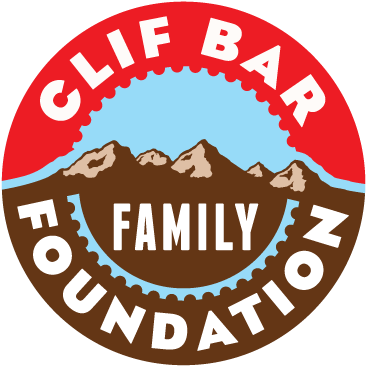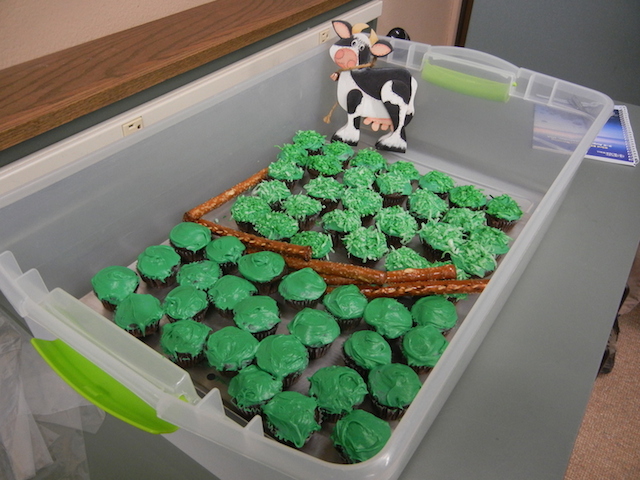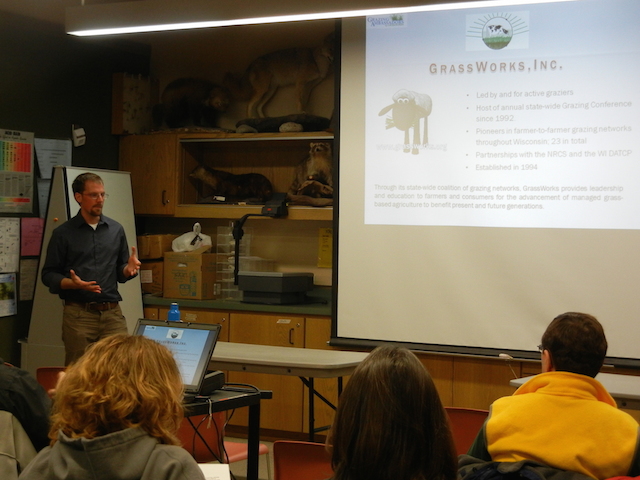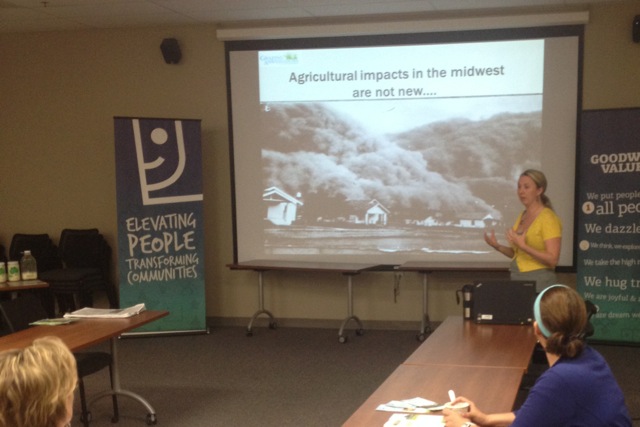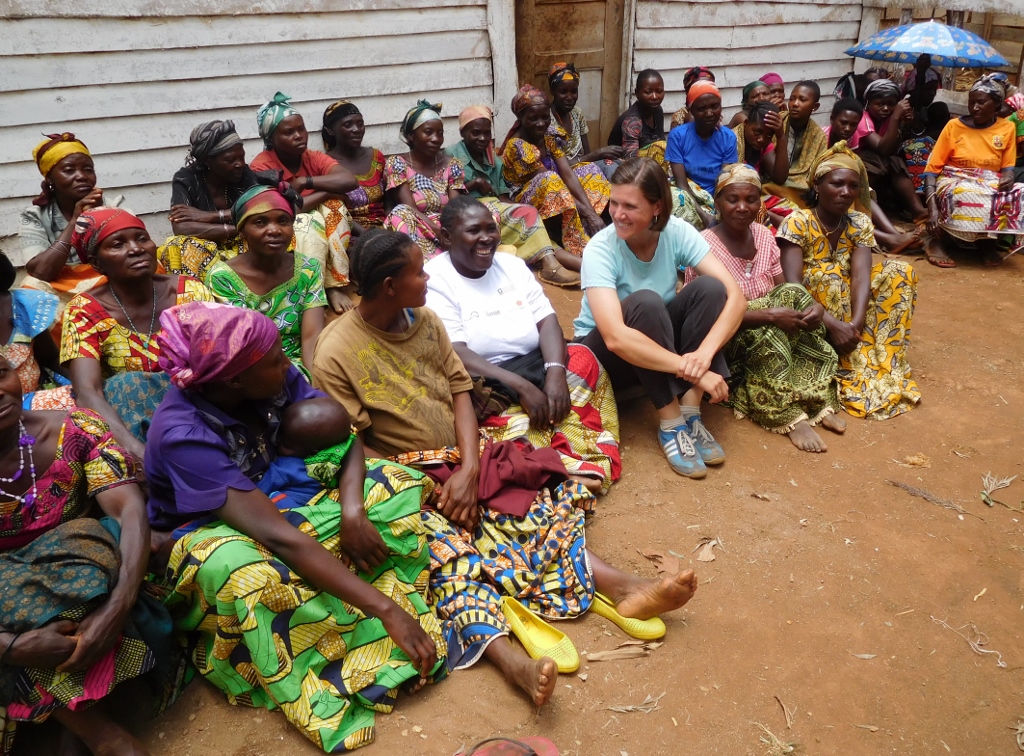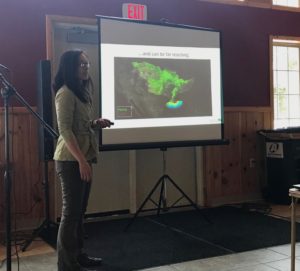
UPCOMING PRESENTATIONS
Check back soon!
PAST HOSTS
Twin Creek Cattle Company (Tomahawk)
Olbrich Botanical Gardens (Madison)
UW-Stevens Point Treehaven Walks (Stevens Point)
Random Lake Conservation Fair (Random Lake)
UW-Green Bay (Green Bay)
Sustain Jefferson (Johnson's Creek)
Baraboo Range Preservation Association (Baraboo)
NE Wisconsin Beef Association (Kelly Lake)
Blue Spring Lake Management District (Palmyra)
The Fort Atkinson Club (Fort Atkinson)
Gottfried Prairie and Arboretum (Fond du Lac)
Dodge County UWEX (Jefferson)
Cedarburg Public Library (Cedarburg)
Willy Street Coop (Madison)
Arboretum Co-Housing (Madison)
Riveredge Nature Center (Newburg)
Audubon Society (Waterloo)
Aldo Leopold Foundation (Baraboo)
Jefferson County (Fort Atkinson)
MKE Talks Green-Outpost Natural Foods (Milwaukee)
Norsk Family Farm Day (Lena)
Godman Community Center (Madison)
Treasures of Oz (Port Washington)
Fox Valley Food Camp (Menasha)
Urban Ecology Center (Milwaukee)
Oneida Nation (Seymour)
Green Lands Blue Waters Conference (Decatur)
Southwest Badger RC&D (Waterloo)
WI Bird Conservation (Chippewa Falls)
WI DNR Endangered Resources Tour (Prairie du Sac)
UW-Madison Animal Welfare Judging Team (Jefferson)
UW-Whitewater SAGE (Whitewater)
Madison Area Permaculture Guild (Madison)
Cituzo & Cisheke (Democratic Republic of Congo)
Dwight Foster Public Library (Fort Atkinson)
Lions Club (Shell Lake)
Nandi Dairy Co-op (Kenya)
Women’s Club (Amery)
Alicia Ashman Library (Madison)
Dorothy Carnes County (Fort Atkinson)
St. Lawrence Eager Beavers 4-H Club (Jefferson)
Marathon Co. Farmers Union (Wausau)

The Grazing Ambassadors Project connects Wisconsin farmers with non-farming communities in order to develop broad literacy about the practice and benefits of managed grazing.
For more information, or to schedule a talk, please contact Patty Laskowski Morren, Executive Director: director@grassworks.org
About
Everybody has to eat. Wouldn't it be great to choose food that positively impacts your taste buds, the earth and everything in between? Wouldn't it be even better to know why?
This interactive, visual presentation gives an overview of how a rotational managed grazing system works, and what sets it apart from other livestock agricultural practices. Audiences will learn that managed grazing supports perennial landscapes, good environmental stewardship, wildlife habitat, animal welfare and human nutrition. They will gain insight into the values held by Wisconsin's grazing community, the economics of grass-based farming, and how consumers plan a vital role in advancing this resilient method.
In addition to the core content, the presentation can be augmented to focus more deeply on a particular area of interest such as encouraging wildlife habitat, human nutrition and animal welfare.
The session lasts roughly 60 minutes, including audience Q & A, but can be shortened or lengthened as needed.
Why?
Through our common need to eat, we hope to facilitate conversations between wide ranging groups in order to make the connections between environmental stewardship, animal welfare, human health, economic opportunity and community development.
For Whom?
A truly diverse range of groups would benefit from participating in the this project. Example audiences include: civic groups, natural resource conservationists, prairie enthusiasts, wildlife advocates, food policy councils and consumers.
By Whom?
Grazing Ambassadors are Wisconsin graziers (grass-based farmers) or grazing experts trained to speak broadly on managed grazing, as well as more specifically about its intersection with a particular topic. Most Ambassadors have cultivated expertise in areas other than farming through work with organizations such as the Aldo Leopold Foundation, the WI Department of Natural Resources, and University of Wisconsin's graduate programs and Extension. This enables them to speak personally about managed grazing's utility beyond livestock production.
Our Grazing Ambassadors Project connects Wisconsin farmers with non-farming communities in order to develop broad literacy about the practice and benefits of managed grazing.
For more information, or to schedule a talk, please contact Patty Laskowski Morren, Executive Director: director@grassworks.org
Funding for this program is generously provided by:
the Clif Bar Family Foundation
